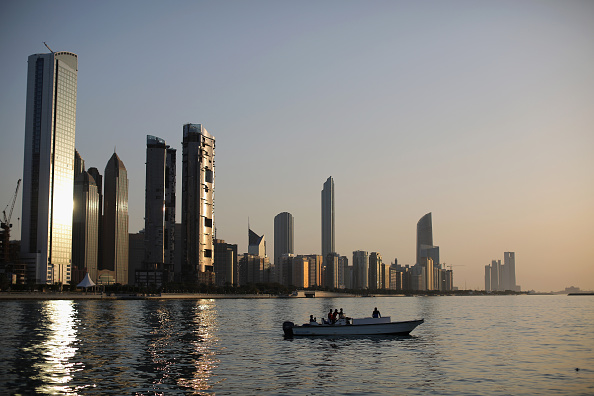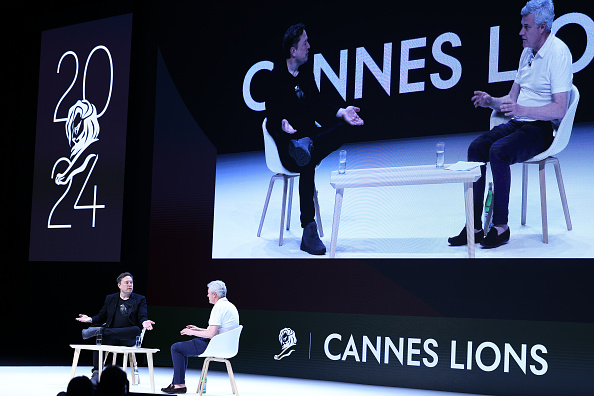The Middle East Becomes the World’s ATM
Flush with cash from an energy boom, Saudi Arabia and other Gulf monarchies have a moment on the world’s financial stage
Five years ago, Saudi officials watched a wave of American finance executives pull out of a free investment confab in Riyadh after the murder of a dissident journalist made the kingdom a toxic place to do business.
This year, the conference, nicknamed “Davos in the Desert,” is expecting so much demand it is charging executives $15,000 a person.
Middle East monarchies eager for global influence are having a moment on the world’s financial stage. They are flush with cash from an energy boom at the very time traditional Western financiers—hampered by rising interest rates—have retreated from deal making and private investing.
The region’s sovereign-wealth funds have become the en vogue ATM for private equity, venture capital and real-estate funds struggling to raise money elsewhere.
The market for marquee mergers and acquisitions has seen a surge of interest from the region. Recently announced deals include an Abu Dhabi fund’s purchase of investment manager Fortress for more than $2 billion and a Saudi fund’s $700 million purchase of global lender Standard Chartered’s aviation unit.
Companies and funds overseen by Abu Dhabi’s national security adviser, Sheikh Tahnoun bin Zayed Al Nahyan, have made runs at buying Standard Chartered and investment bank Lazard. They have also struck recent deals to buy a $1.2 billion U.K. healthcare company and to take partial control of a nearly $6 billion Colombian food giant.
“Now, everybody wants to go to the Middle East—it’s like the gold rush in the U.S. once upon a time,” said Peter Jädersten, founder of fundraising advisory firm Jade Advisors. “It’s difficult to raise money everywhere.”
Fund managers visiting the region say they often wait across from rivals in waiting rooms of sovereign-wealth funds. Silicon Valley and New York managers are a near-constant presence in the white-marble floored lobby of the Four Seasons Abu Dhabi, as with other top hotels, they say.
The Riyadh conference next month—a pet project of Saudi Crown Prince Mohammed bin Salman known as the Future Investment Initiative—is expected to be a magnet for money hunters. In 2018, Wall Street executives backed out after Saudi operatives murdered journalist Jamal Khashoggi, and for years many startups and funds said they avoided investment from the country over moral concerns.
Some companies continue to steer clear of the kingdom, while human-rights groups say its record on treatment of government dissidents remains a serious problem.
But Saudi funding became more in demand last year when other money began to get tight. At last year’s conference the Public Investment Fund’s chief, Yasir Al Rumayyan, sat on a panel discussion with two of the world’s biggest investment-firm executives, Blackstone’s Stephen Schwarzman and Ray Dalio, founder of Bridgewater Associates. Top names in venture capital mixed on the floor, and FTX chief Sam Bankman Fried looked for funding.
Ben Horowitz, partner at Andreessen Horowitz, said at a PIF-sponsored conference this spring that Saudi Arabia was a “startup country,” and referred to Prince Mohammed as its “founder” who was creating a new culture and new vision for the country.
The region’s new dominance is most apparent among private funds, the type that lock up investors’ money for years. While detailed statistics are scarce, figures at two of the biggest sovereign funds suggest a surge. At Saudi’s PIF, commitments for “investment securities”—a category that includes private funds—rose to $56 billion in 2022, up from $33 billion a year earlier. Abu Dhabi’s Mubadala reported that equity commitments doubled to $18 billion in 2022.
Executives at private-equity giants TPG, KKR and Carlyle Group have told investors that interest from the Middle East remains strong while other parts of the world recede.
“If you’re in the U.S., there’s a certain degree of concern,” Carlyle CEO Harvey Schwartz said at a June conference. Middle East investors, he said, are “very front-footed, very dynamic.”
While the Middle East steps on the gas, the traditional backers of investment funds—pension plans and college endowments—are in retreat. The global shift to higher interest rates caused losses in the biggest parts of their portfolios—especially stocks and bonds.
Investors put $33 billion toward U.S.-based venture capital funds in the first half of 2023, less than half the $74 billion in the same period in 2021, according to PitchBook. Global fundraising for all private funds fell 10% last year to $1.5 trillion, according to Preqin—a decline many expect to continue.
“Fundraising has become much, much harder over the past 12 months,” said Brenda Rainey, an executive vice president at Bain & Co. who advises private-equity funds.
The reason for the region’s burst of funding and deal making is twofold.
Higher energy prices—a byproduct of Russia’s invasion of Ukraine—have given the region’s oil- and gas-dependent wealth funds tens of billions of dollars of extra money to spend. That means a drop in oil prices could quickly cause a pullback from the Gulf countries, as has happened in energy booms-turned-bust of the past.
At the same time, Saudi Prince Mohammed and top officials in the U.A.E. have jostled for greater sway on the world stage—in geopolitics, finance and sports—pumping additional money into their wealth funds to do deals and expand industry at home.
The intersection of politics and finance in the region has led Gulf wealth funds from Saudi Arabia, the U.A.E. and Qatar to be the main financial backers of two key Trump administration figures: Jared Kushner and former Treasury Secretary Steven Mnuchin, who together raised billions of dollars from the region.
Gulf funds have pushed their U.S. peers to open offices in the region to more easily win investments, fund managers say.
BlackRock has said it would create a team on the ground in Riyadh dedicated to boosting investment into infrastructure projects in the Gulf.
Millennium Management LLC, based in New York, set up an office in Dubai in 2020 and others followed, including private-equity firm CVC Capital Partners and ExodusPoint Capital Management, the largest-ever hedge-fund startup with $8 billion in initial capital. Europe’s Tikehau Capital and Ardian both established teams in Abu Dhabi, and U.S. alternative investment manager, Pretium, hired a local industry veteran from Dubai.
Dalio also set up an office in Abu Dhabi for the Dalio Family Office, his personal venture. Rajeev Misra, a longtime financier for SoftBank Group who secured over $6 billion in commitments for a new venture from multiple Abu Dhabi-aligned investment funds, is moving to the U.A.E. from the U.K., according to people familiar with his plans.
There is now an “awareness that relationships have to be built and that doesn’t happen overnight,” said Joseph Morris, a Dubai-based managing director at U.S.-based advisory firm Newmark Group.
The venture capital arm of Tiger Global has struggled to raise its latest fund, repeatedly cutting its target by billions of dollars. Stung by losses and the cooler fundraising environment, many U.S. investors have given it the cold shoulder, investors say.
One place it found success: Saudi Arabia. A division of PIF, Sanabil, this spring added Tiger’s name to the public list of fund managers it backs. Others on the list include Peter Thiel’s Founders Fund and Andreessen Horowitz.
Ibrahim Ajami, who oversees startup investments at Abu Dhabi state fund Mubadala, which invests in companies as well as funds, said the environment gives Mubadala the ability to be “very thoughtful and selective” about who it backs.
He can negotiate terms that let Mubadala buy a stake in the fund manager itself, he said, or allow it to invest alongside others.
“What we are doing is going deeper—and more concentrated and more engaged—with a select group of managers,” he said.
—Summer Said and Berber Jin contributed to this article.
 Copyright 2020, Dow Jones & Company, Inc. All Rights Reserved Worldwide. LEARN MORE
Copyright 2020, Dow Jones & Company, Inc. All Rights Reserved Worldwide. LEARN MORE
This stylish family home combines a classic palette and finishes with a flexible floorplan
Just 55 minutes from Sydney, make this your creative getaway located in the majestic Hawkesbury region.
Continued stagflation and cost of living pressures are causing couples to think twice about starting a family, new data has revealed, with long term impacts expected
Australia is in the midst of a ‘baby recession’ with preliminary estimates showing the number of births in 2023 fell by more than four percent to the lowest level since 2006, according to KPMG. The consultancy firm says this reflects the impact of cost-of-living pressures on the feasibility of younger Australians starting a family.
KPMG estimates that 289,100 babies were born in 2023. This compares to 300,684 babies in 2022 and 309,996 in 2021, according to the Australian Bureau of Statistics (ABS). KPMG urban economist Terry Rawnsley said weak economic growth often leads to a reduced number of births. In 2023, ABS data shows gross domestic product (GDP) fell to 1.5 percent. Despite the population growing by 2.5 percent in 2023, GDP on a per capita basis went into negative territory, down one percent over the 12 months.
“Birth rates provide insight into long-term population growth as well as the current confidence of Australian families,” said Mr Rawnsley. “We haven’t seen such a sharp drop in births in Australia since the period of economic stagflation in the 1970s, which coincided with the initial widespread adoption of the contraceptive pill.”
Mr Rawnsley said many Australian couples delayed starting a family while the pandemic played out in 2020. The number of births fell from 305,832 in 2019 to 294,369 in 2020. Then in 2021, strong employment and vast amounts of stimulus money, along with high household savings due to lockdowns, gave couples better financial means to have a baby. This led to a rebound in births.
However, the re-opening of the global economy in 2022 led to soaring inflation. By the start of 2023, the Australian consumer price index (CPI) had risen to its highest level since 1990 at 7.8 percent per annum. By that stage, the Reserve Bank had already commenced an aggressive rate-hiking strategy to fight inflation and had raised the cash rate every month between May and December 2022.
Five more rate hikes during 2023 put further pressure on couples with mortgages and put the brakes on family formation. “This combination of the pandemic and rapid economic changes explains the spike and subsequent sharp decline in birth rates we have observed over the past four years,” Mr Rawnsley said.
The impact of high costs of living on couples’ decision to have a baby is highlighted in births data for the capital cities. KPMG estimates there were 60,860 births in Sydney in 2023, down 8.6 percent from 2019. There were 56,270 births in Melbourne, down 7.3 percent. In Perth, there were 25,020 births, down 6 percent, while in Brisbane there were 30,250 births, down 4.3 percent. Canberra was the only capital city where there was no fall in the number of births in 2023 compared to 2019.
“CPI growth in Canberra has been slightly subdued compared to that in other major cities, and the economic outlook has remained strong,” Mr Rawnsley said. “This means families have not been hurting as much as those in other capital cities, and in turn, we’ve seen a stabilisation of births in the ACT.”
This stylish family home combines a classic palette and finishes with a flexible floorplan
Just 55 minutes from Sydney, make this your creative getaway located in the majestic Hawkesbury region.






















